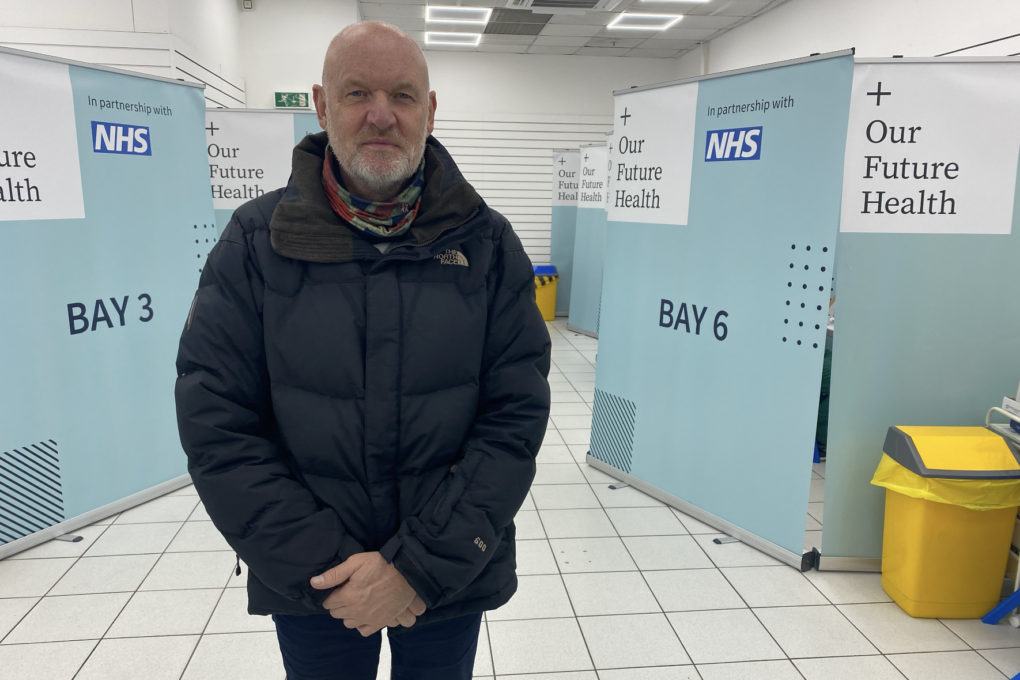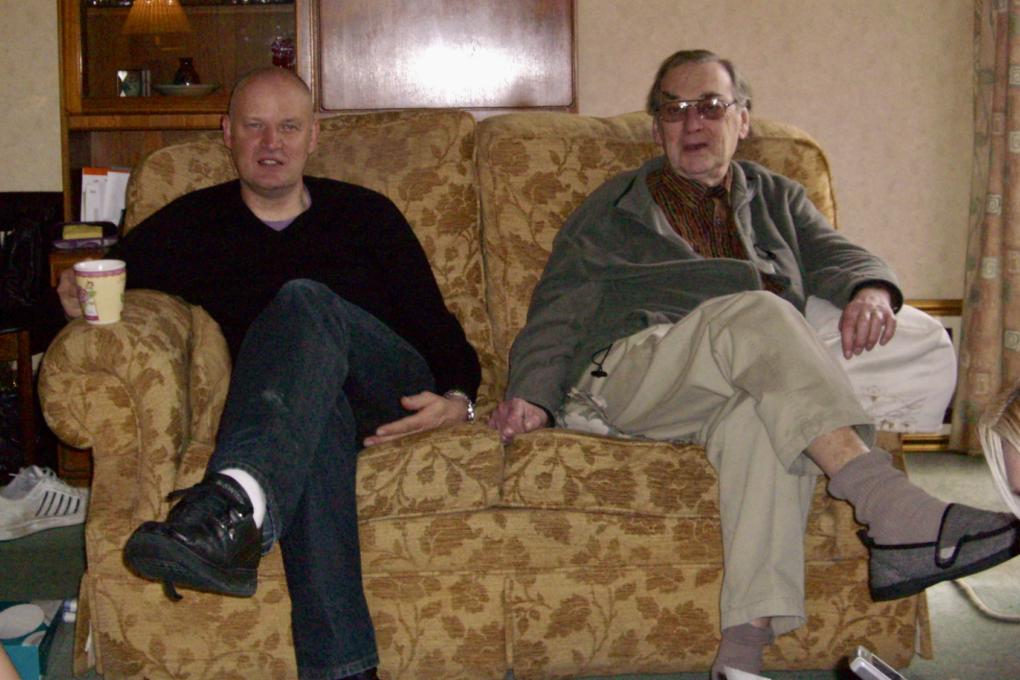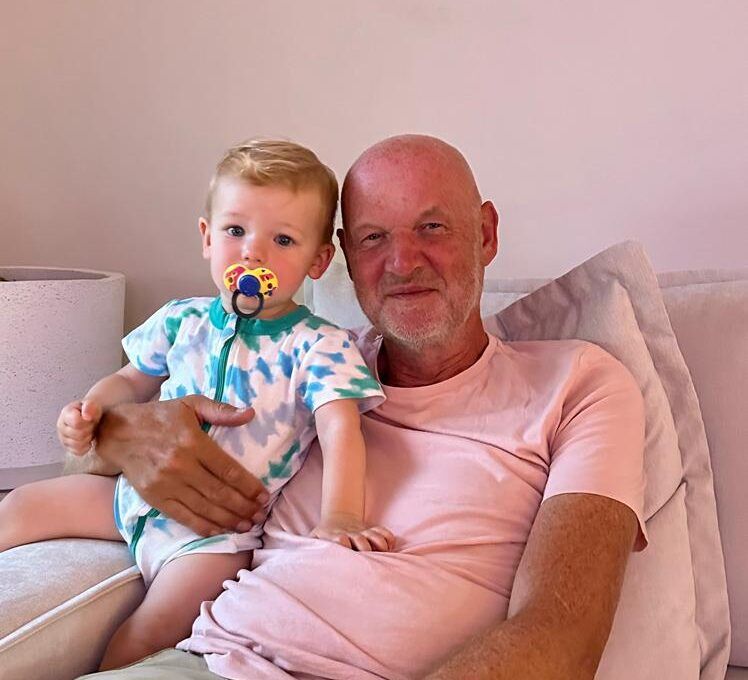‘I have prostate cancer. By signing up to Our Future Health I’m hoping I can help my sons’ chances of beating the disease’

For 61-year-old Neil Hardisty, the chances of being diagnosed with prostate cancer always seemed high. Both his father and grandfather had suffered from the disease. “With my grandfather – in those days it pretty much went undetected,” he says. “And it was also largely undetected with my father, but then the cancer went into his bones. In the end he sort of out-lived it, which is where I’d like to be.”
Neil, who lives in Saddleworth and is a retired car parts company manager, began having his prostate-specific antigen (PSA) levels checked when he turned 50 – something that’s advised by the NHS for every man over that age. “It wasn’t prompted by my dad – I just went through routine tests. It was eventually picked up that my PSA level was increasing slowly.” Neil was told he was likely to be developing the cancer.
A common cancer
Prostate cancer is now so common that one in eight men in the UK will be diagnosed with it at some point during their lives. 12,000 men die from it annually, and in 2018, it overtook breast cancer to become the most diagnosed cancer in England.
Your risk of being diagnosed increases as you get older, especially after your 50th birthday – the most common age of diagnosis is between 65 and 69. Ethnicity can play a role, too – black men are more at risk, with one in four black men in the UK receiving a diagnosis during their lifetime.
For Neil, despite being fit and healthy, the fact that he had a family history of the disease meant he was already two and half times more likely to get the disease. His mother also had breast cancer, which is an additional factor thought to increase prostate cancer risk.
Despite its prevalence, prostate cancer remains something of a taboo subject among men, partly because of methods of diagnosis, and partly due to treatments. Even though some recent high-profile cases have gained media coverage such as Stephen Fry, who had his prostate removed in 2018 following his diagnosis, and Bill Turnbull, who died from the disease in 2022, most men don’t know much about the prostate. A 2016 survey by Prostate Cancer UK found that 92% of men did not know what the prostate gland did, 52% didn’t know where it was located and 17% didn’t even know they had a prostate.
Dealing with the unspoken
Neil was more aware than most, thanks to the experiences of his father and grandfather. While a first biopsy on his prostate came back all clear, a second one towards the end of 2022 confirmed the presence of cancerous cells. His diagnosis was stage T2 – where the tumour appears to be confined to the prostate and has not spread – with a PSA reading of 7ng/ml (it should be below around 4) and a Gleason grading score of 3+4 (a total of 7 out of 10, meaning the cancer is expected to grow slowly).
“I found the diagnosis very upsetting even though I was expecting it,” he recalls. In consultation with his doctors, Neil decided not to pursue immediate treatment, as the consequences can be unpleasant. “The two current treatments in my area – radiotherapy or a prostatectomy [a complete removal of the prostate] – are associated with an increased risk of incontinence and erectile dysfunction, which would completely screw my life up,” he explains.
Instead, Neil is under active surveillance, with doctors checking on the spread of the cancer via PSA tests every three months and MRI tests every six months for the next year before the situation is reassessed.

Technological advances
One thing that has provided solace to Neil is the way detection and treatment of prostate cancer is improving. For example, he says his biopsies, which were only four years apart, were very different experiences. “The first time I had a biopsy, about four years ago, it involved a big piece of equipment that went up my backside which basically bit chunks out of my prostate. The most recent biopsy I had involved a needle passing through my scrotum. It was far less invasive and much more targeted.”
Similarly, Neil has been told he’s eligible for a new treatment called focal therapy. “The treatment involves a more detailed targeting of the cancer with cryotherapy – they focus on the cancerous cells, freeze them and kill them, leaving the rest of the prostate intact. It’s not classed as experimental within the NHS, but it hasn’t been properly signed off. There’s a reasonably high rate of the cancer returning, whereas with radiotherapy there isn’t and obviously with a prostatectomy there’s definitely not.” However, the advantage of focal therapy is that there’s a far smaller risk of side effects like erectile dysfunction and incontinence.
How data can shape the next steps
Neil joined Our Future Health to give something back to the NHS – the service that has helped track and diagnose his cancer – as well as to provide his own invaluable data, specifically regarding prostate cancer, for future generations. “It’s of massive importance that research and development continues, because that’s the only way that we learn and question whether we can we deal with this differently,” he says.
Dr Michael Cook, Director of Epidemiology at Our Future Health, underscores the importance of volunteers like Neil signing up to the programme: “By choosing to join Our Future Health and donate your data for research purposes, people like Neil are making a huge contribution to reducing the burden of cancer and other diseases in the UK population.
“For example, by studying PSA trajectories and discovering new blood tests, we will be better able to detect prostate cancer and predict not just how aggressive it is at diagnosis, but also how aggressive it may become in the future. The information will help us tailor healthcare to the individual. It will save lives in the future.”
Following his experience, Neil tells every man he meets aged over 50 the importance of getting checked, especially if they have any history of the disease in the family. “The younger generations, of course, will get checked – they see it as necessary. I’ve got two sons and a little grandson, and because of what I’m going through they have a much better understanding of it than I did when I was their age.”
He remains optimistic about the future, and stresses how lucky he feels that his cancer was picked up when it was. “Because I’d been having regular checks it was detected at a very early stage, which gives me options with regard to treatments that wouldn’t have been possible had the cancer progressed undetected.”

Volunteer Voices
Volunteer Voices is a regular series that showcases our participants and their reasons for joining Our Future Health. You can find the full series here, or click on one of the below links for an individual story…
Joanne Foden: ‘I wouldn’t be here without the NHS – I wanted to give something back’
Paul Hooley: ‘Joining Our Future Health is like leaving your body to medical science – while you’re still alive’
Renuka Baldwin: ‘I want to help people like me in the future’
Would you like to be featured in Volunteer Voices? Get in contact with us by emailing stories@ourfuturehealth.org.uk. Everyone has something unique to give.

Let’s prevent disease together
By volunteering for Our Future Health, you can help health researchers discover new ways to prevent, detect and treat common conditions such as diabetes, cancer, heart disease, stroke and Alzheimer’s.